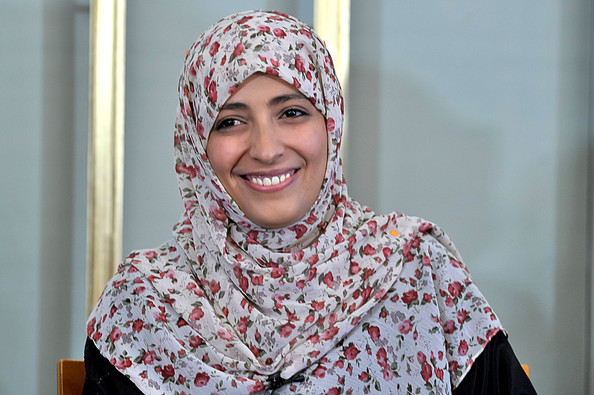Tawakkol Karman: Nobody’s Pawn
 The lady speaks her mind and would appreciate an opportunity to do so without getting harassed – or silenced – in the process. Tawakkol Karman, who shared the 2011 Nobel Peace Prize with two Liberian peace activists, is one of the many faces that marked the Arab Spring. Though the popular movement may have fizzled out, it did leave an indelible imprint behind.
The lady speaks her mind and would appreciate an opportunity to do so without getting harassed – or silenced – in the process. Tawakkol Karman, who shared the 2011 Nobel Peace Prize with two Liberian peace activists, is one of the many faces that marked the Arab Spring. Though the popular movement may have fizzled out, it did leave an indelible imprint behind.
Mrs Karman steadfastly refuses to be classified or boxed-in. Though an active member of Al-Islah – the Yemeni branch of the Muslim Brotherhood – she declines to speak on behalf of the party and, pointedly, does not endorse its more extreme positions. She also opposes any kind of Islam-inspired revolution: “The ousting of President Ali Abdullah Saleh in 2012 was not meant to solve political issues. The aim was to address societal problems.”
Bringing a whiff of pragmatism to Yemen’s often tumultuous political scene, Mrs Karman deplores the continued interventions by a host of foreign powers that destabilise the country and do little or nothing to address the plight its population. She has repeatedly called on the US government to end its drone strikes, arguing that the policy not only violates Yemeni sovereignty and international law, but also swells the ranks of terrorist groups such as Al-Qaeda.
Mrs Karman has devoted much of her energy to furthering the cause of Arab women in Yemen and elsewhere. She has drawn worldwide attention to the malnutrition suffered by many Yemeni girls, as boys are habitually awarded priority access to whatever little food may be on the table, and is an advocate for a ban on child marriages.
She shed the traditional niqab and now sports colourful hijabs instead, arguing that Yemeni women should stop seeing and feeling themselves as part of the problem, and dare become part of the solution: “We have been marginalised for far too long and need not ask anybody’s permission to stand up and become active members of society.”
More recently, Mrs Karman has accused disgraced former President Saleh of being in cahoots with the Iran-backed Houthi (Ansar Allah) rebels who have long dominated the northern governorates and last February forced the constitutional government of President Abd Rabbuh Mansour Hadi to vacate the capital Sana’a and move to Aden in the south of the country.
When the insurgents marched south in hot pursuit, President Hadi had to flee the country by sea. Egypt and neighbouring Saudi Arabia, already annoyed by the Shi’ite presence along its southern border, unleashed yet another storm on the Arab Peninsula; building up an intervention force and sending in bombers to rain destruction from the sky.
Recent developments have thus confirmed Mrs Karman’s worst fears: domestic strife, fuelled by outside interest, denies Yemen society the opportunity to set a national agenda suited to its aspirations. “Injustice is exploding while opportunities for a good life are coming to an end.”
Leading the Women Journalists without Chains group, Mrs Karman continues to rally against the violation of her country. She recently asked the Emir of Qatar, Sheikh Tamim bin Hamad Al Thani, for help in setting up an independent radio and television station for Yemen to enable a new generation of female reporters to receive training and offer a counterweight to male-dominated official media outlets.
After meeting Turkish Foreign Minister Mevlut Cavusoglu in Ankara just days after the start of the Egypt / Saudi offensive against the Houthi rebels, Mrs Karman delivered a passionate plea for help, stating that the Yemeni people deserve deliverance from the Shi’ite militias that have overrun the country. “While I encourage the Houthi to remain active as a political party, they cannot be allowed to hijack the nation.”
You may have an interest in also reading…
Peter Carington: The Sole Survivor of a Bygone Era
The first casualty of the 1982 Falklands War, and one of the last scions of the empire-building Eton / Sandhurst
Magnus Carlsen: In Pursuit of Perfection and Committed to the Art of Chess
The best chess player ever? It’s probably Magnus Carlsen, according to … Magnus Carlsen. The Norwegian grandmaster, now 28, is
PJ O’Rourke: One of the Last of the Gonzo Journalists
A gonzo-style journalist par excellence, PJ O’Rourke will seldom fail to tackle serious societal issues with sarcastic humour and some


















































































